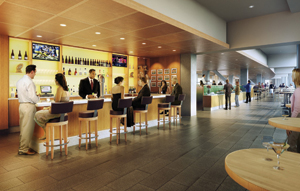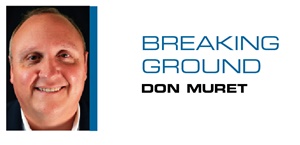The group marketing new premium seats at the
Rose Bowl Stadium is launching a national sales campaign for the bowl game itself.
Starting Wednesday, Legends Premium Sales, a division of Legends Hospitality Management, will contact Fortune 500 companies in select Big Ten and Pac-12 markets in an effort to sell 400 of the 1,180 club seats for the Rose Bowl game. Firms in Chicago, Columbus, Detroit, Denver, San Francisco and Seattle will be targeted, said Jason Gonella, Legends’ vice president of sales. Those seats are tied to the stadium’s $152 million renovation.
 |
NEOSCAPE / ROSE BOWL STADIUM
Rendering shows the club that will serve ticket holders for the new club seats at the Rose Bowl, part of $152 million in renovations. |
The campaign is a “bit of a test,” according to Gonella. Earlier this year, Legends began selling the 54 new suites planned for the stadium and recognized two groups of buyers: those interested in skyboxes for UCLA games only and others who preferred to buy for the Rose Bowl. After observing the trend, Legends decided to expand the market for club seats.
Club seat prices range from $3,000 to $4,000 a seat per season for all football games at Rose Bowl Stadium, $2,000 to $3,000 for UCLA only and slightly more than $1,000 for the Rose Bowl game only.
The model is not unique in Pasadena. The NFL and NCAA market premium-seat packages to national companies for the Super Bowl and Final Four, respectively. The same is true for major league arenas that sell suites and club seats separately for their NBA and NHL tenants.
As of mid-October, Legends had sold 34 suites and 14 of 48 loge boxes. Premium-seat revenue will pay for half the construction cost. The multiyear project will be completed in time for the 2013 college football season.
GET RIO: The sports practice within the world’s biggest architect is starting to form a master plan for the 2016 Rio Olympics.
AECOM, a global provider of technical and management support services, recently won an international competition to develop the plan for Olympic Park in Rio de Janeiro. The 280-acre park, on the site of a Formula One racetrack, will be a mix of existing facilities and new venues serving basketball, gymnastics, swimming and tennis, among other sports. Olympic Park is one of five zones in Brazil carved out for Olympic competition. The racetrack itself is being moved to another location.
This summer, about one month before AECOM won the job in Brazil, the company hired J Parrish and four other sports architects from Arup, a British design firm. Parrish designed the Bird’s Nest, the stadium that became the face of the Beijing Olympics, as well as Allianz Arena in Munich, the Singapore Sports Hub and Etihad Stadium, home of Manchester City soccer. Parrish’s conceptual design of Olympic Park venues was key to AECOM capturing its second consecutive Olympics master plan, according to AECOM’s Bill Hanway.
For Hanway, the firm’s London-based executive director for operations, planning, design and development, the Rio Games come on the heels of the master plan he was in charge of developing for the 2012 London Olympics.
Aside from cultural differences between the two cities, London’s urban site with waterways and industrial buildings required major changes to the infrastructure before work could begin on Olympic construction. The Rio site, by comparison, has a relatively flat landscape with few buildings to tear down, so the layout provides a much easier starting point for AECOM officials to map out the components of Olympic Park, Hanway said.
The common goal for both cities is sustainability. In that respect, the competition extends beyond the field of play to see whether London or Rio will be the greenest Games in history. The Rio Olympics, because it comes later, has the upper hand, Hanway said.
“For Rio, because of its hydroelectric dams, water management and water resources are more important,” he said. “Sustainability is a priority in both London and Rio, but the approach in how we achieve those goals will be slightly different.”
Don Muret can be reached at dmuret@sportsbusinessjournal.com. Follow him on Twitter @breakground.





